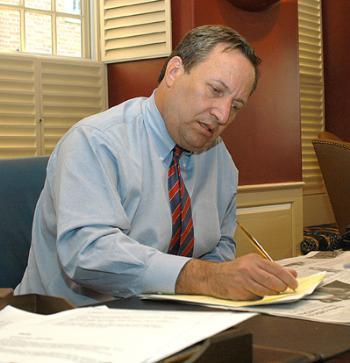Lawrence H. Summers rushed from meeting to meeting this year, his coterie of staffers struggling to keep up. More aides sweated away in the bowels of Mass. Hall, churning out briefing books by the ream. And these handlers and spokespeople lit up the University’s switchboards, following up on their boss’s latest whim.
This is the world of the Treasury Secretary turned University president, and this year, with his rocky start behind him, Summers began to produce some results. Trained in the D.C. jungle of red tape, the sophomore president was able to wield his authoritative, top-down style to productive ends.
Out of Summers' Mass. Hall office sprung several new deans, and with them new visions of the schools they were chosen to lead. He kicked off a much touted graduate student financial aid program that promises to help encourage public service around the university. And he did his best to mold Harvard to fit his executive style—taking steps to make the wildly decentralized and often chaotic University a little bit easier to lead.
But while Harvard may possess its share of red tape waiting for Summers’ shears, the University is no government agency. Summers has his superiors, the Harvard Corporation, to please. And he has his subordinates to help him execute his plans. But most of the University’s activities lie outside of this clear hierarchy—and in the hands of the faculty.
When it comes to his broader goals—the reinvigoration of the College, a focus on life sciences, and even planning for a new campus in Allston—Summers will need to have the faculty on board. Unlike the progress of the last year, Summers will not be able to order these objectives into being.
Summers has learned, to his frustration, some say, that universities do move at a different pace, as he’s found progress on his bigger goals to be slow-going.
But after another year at the helm, Summers still hasn’t proved whether he can persuade, push and cajole the faculty to rally behind his plans.
Navigating the Jungle
Summers didn’t begin his second year at Harvard with a completely clean slate.
The fall-out from his clash with former Fletcher University Professor Cornel R. West ’74—which dominated his first year—carried over from the spring.
But after Summers and new Faculty of Arts and Sciences (FAS) Dean William C. Kirby successfully lobbied the Chair of the Department of Afro-American Studies Henry Louis “Skip” Gates Jr. to stay at Harvard, that controversy subsided.
Summers continued to make waves, but his controversial moves were more deliberate and less distracting than last year’s Af-Am disaster, none coming to dominate his year.
In September, when Summers delivered a speech at morning prayers accusing some at Harvard and in the world of positions that were “anti-Semitic in their effect if not in their intent,” it was at the time and place of his choosing.
Summers, who publicized the speech heavily, seemed to have picked his battle carefully, and appeared satisfied with the mix of criticism and applause the provocative statements elicited.
Summers also drew scrutiny for his perceived influence in the English department’s November decision to cancel a poetry reading by Tom Paulin, whose works some consider to be anti-Israel.
Read more in News
Pataki: 'Yale is Going to Crush Harvard'













